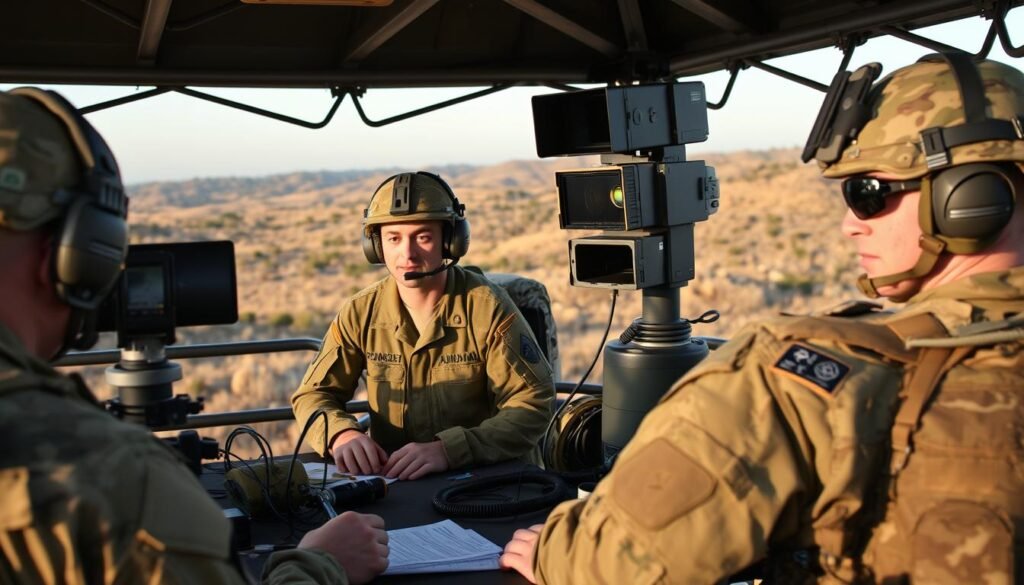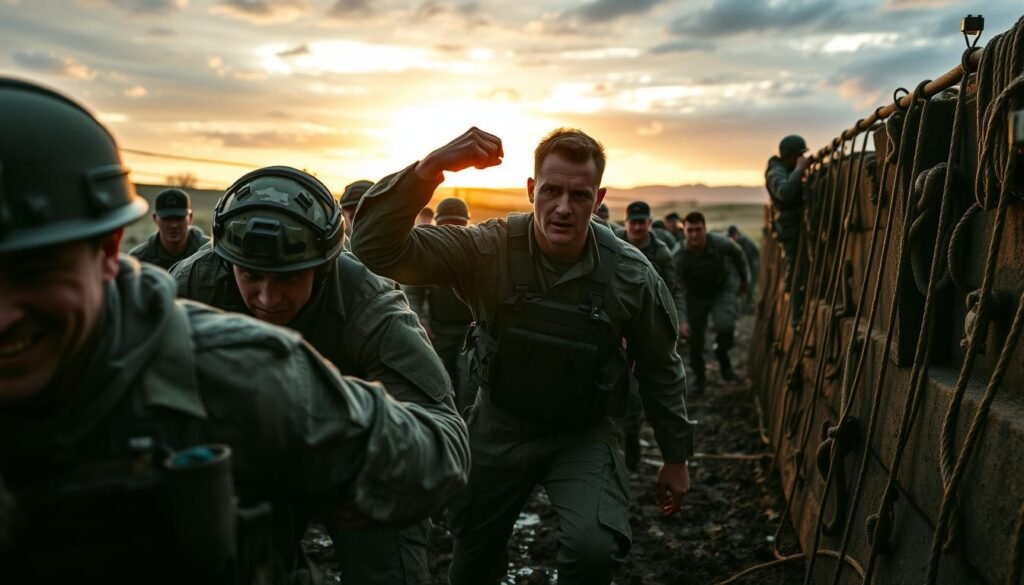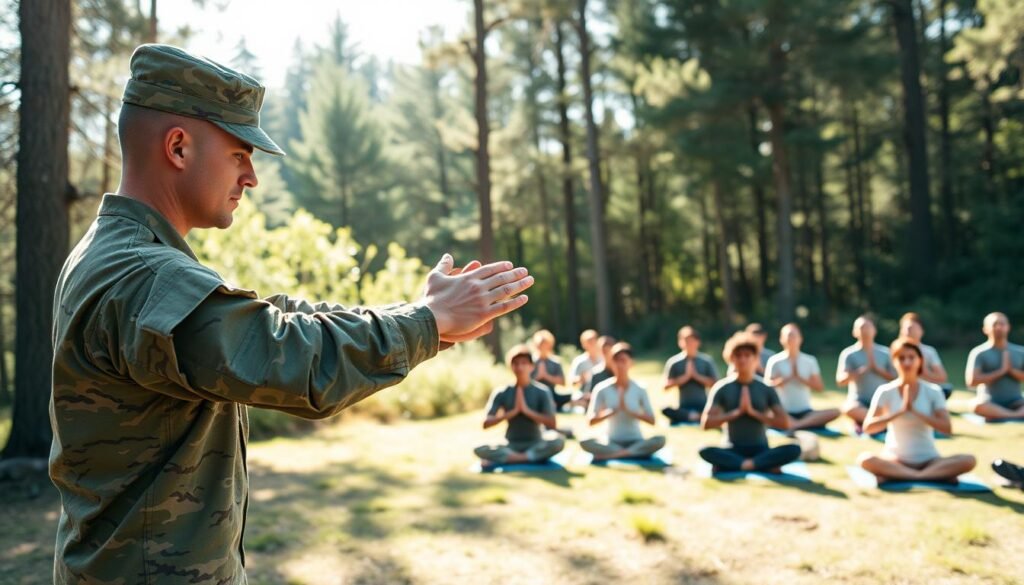In 2014, there were 628 Army accidents caused by fatigue. These led to 32 deaths. These numbers show why it’s crucial to tackle physical and mental fatigue in the military. Soldiers face increased stress and tough conditions today. This results in more combat stress. Not getting enough sleep, often just over six hours a night, has serious effects. It can cause chronic diseases and make cognitive abilities drop, similar to being drunk while on duty.
Military personnel must understand how fatigue affects military readiness. Managing fatigue can boost performance and keep soldiers safe and healthy. We will look at causes, consequences, and ways to handle fatigue. This aims to give a full view on dealing with combat stress and increasing resilience among military members.
Key Takeaways
- Fatigue greatly increases the chance of accidents and deaths in the military.
- Getting enough sleep is key for thinking clearly and staying healthy.
- Combat stress can show many symptoms and hurt soldiers in body and mind.
- Managing sleep well can lessen fatigue’s negative effects on military missions.
- Better training and recovery methods lead to improved performance and readiness.
Understanding Physical and Mental Fatigue
Understanding fatigue is vital for top performance in military settings. Soldiers deal with both mental and physical fatigue. This affects their performance in operations. They might carry over 100 pounds of gear, leading to exhaustion. Just 500 meters in, a tired soldier could miss key signs, risking ambush.
Physical training helps but can’t remove fatigue completely. Adding unnecessary items makes soldiers tired and could cause mission failure. It’s important to plan rest for crews. Without rest, the mission and lives are at risk. Soldiers need to be mentally alert to face today’s dangers.
The battlefield has many physical challenges. These include harsh weather, heavy equipment, and tough landscapes. Mental stress comes from having to quickly adapt to changing situations. Stress can also come from the enemy, the team, or personal issues. This makes understanding fatigue complex.
Stress is needed to react to challenges. But too much or too little stress affects thinking. Fatigue comes from hard work, lack of sleep, and high stress. It’s common and needs fast action for treatment.
Not managing fatigue can lead to injuries or worse. Keeping a balance between work and rest is crucial. Long-term health issues can come from constant stress. For more on military work fatigue, see this study.
Causes of Fatigue in Military Environments
Military life is tough and can lead to fatigue. This affects performance and well-being. Knowing the causes helps soldiers manage their energy and stay effective on missions.
Physical Causes of Fatigue
Many factors cause physical fatigue in the military. Long exertion, short recovery times, and carrying heavy loads contribute. Soldiers in hard training can get physically tired, especially with little rest.
Conditions like back pain make recovery harder. Also, certain climates disrupt sleep. For instance, Alaska’s long days and harsh weather affect rest. Losing sleep can drop performance by 25-30% after 24 hours without it.
Mental and Emotional Causes of Fatigue
Mental fatigue comes from high stress. This includes combat and constant mental work. Emotional fatigue might come from anxiety, depression, or family stress, like caring for children who wake up at night.
These issues harm sleep quality and health. It’s important for soldiers to recognize these signs. The Leader’s Guide to Crew Endurance helps leaders find and fix fatigue problems. This keeps the military force healthy and alert.
Impact of Sleep Deprivation on Soldiers
Sleep deprivation is a big problem for soldiers, hurting their health and how well they do their jobs. About 76% of Army members get less than seven hours of sleep at night. This is much more than the 37% of regular people in the U.S. who report the same. Not getting enough sleep can mess with how well they think and react, which affects missions.
Consequences for Cognitive Performance
Sleep loss does more than just make soldiers tired. Studies show those getting under five hours of sleep might face serious issues like PTSD or depression. Sleep problems are also linked with a higher chance of suicide in veterans. This makes getting good sleep in the military super important. One study even found that not sleeping enough can make someone act as if they’re drunk, increasing accident risks.
Sleep Management Strategies
It’s crucial to have good sleep plans for the military to work at its best. Changing when soldiers do physical training can help them sleep better. Also, trying sleep banking—getting extra sleep before busy times—helps keep them sharp for important tasks. To learn more about fighting sleep trouble, check out this resource.
Physical and Mental Fatigue in the Military
The military brings unique challenges. These can cause physical and mental fatigue. Soldiers face situations that need fast thinking and keen observation. It’s critical to know when fatigue is happening. This keeps operations running smoothly and keeps soldiers healthy. Keeping an eye on fatigue can greatly help mission success and wellbeing.
Signs and Symptoms of Fatigue
Fatigue shows up in many ways. Here are common signs:
- Irritability and mood swings
- Having a hard time focusing or making decisions
- Less physical strength and endurance
- Getting hurt more easily
- Feelings of muscle pain and extreme tiredness
Spotting these signs early can help manage them quickly. This reduces risks tied to fatigue during missions.
Strategies for Monitoring and Assessment
Monitoring fatigue means using smart strategies. Here are some ways to do it:
- Use wearable tech to track physical activity as it happens.
- Use smart algorithms to study biometric data and measure how tired soldiers are.
- Have soldiers fill out surveys to say how they feel about their fatigue.
- Encourage soldiers to watch out for each other’s energy levels.
These methods improve our understanding of fatigue. They also guide us in preventing harm. With a strong system for monitoring fatigue, leaders can keep soldiers at their best.

| Assessment Strategy | Description | Benefits |
|---|---|---|
| Wearable Sensors | Devices that track physical activity and physiological signals | Provides real-time data for quick assessments |
| Machine Learning Algorithms | Analysis of biometric data to quantify fatigue severity | Enhances accuracy in identifying fatigue levels |
| Self-Reporting Surveys | Questionnaires that allow soldiers to express their fatigue experiences | Captures subjective feelings of fatigue and wellbeing |
| Peer Observation | Team members observe and report on each other’s fatigue | Encourages teamwork and support in managing fatigue |
Managing Combat Stress Effectively
Dealing with combat stress is key for the well-being of military personnel. They face unique challenges like moving often and being away from family. Because of this, knowing how to manage stress is important to stay ready and healthy.
Stress can help us grow, but too much can hurt our daily lives. It can cause headaches, anxiety, and depression. There are stress zones to know: Green means ready, Yellow means a little stressed, and Orange means very stressed. Seeing these signs early helps soldiers get help before things worsen.
Military leaders need to create a safe space for reporting stress. Talking openly about mental health helps reduce stigma. Managing stress well includes getting enough sleep, setting achievable goals, and using techniques like mindfulness and exercise.
Studies show many soldiers deal with acute stress, which could lead to PTSD. Not all stress leads to long-term problems, but knowing the signs and handling them well is crucial. The military must focus on mental health to support their people properly.
To learn more about military stress and its impact, visit this resource. Being informed helps everyone in the military handle stress better.
Resilience Training: Building Mental Toughness
Resilience training is key for mental toughness in the military. It teaches soldiers how to handle combat challenges. This not only helps individuals but also makes teams more ready for battle.
Importance of Mental Toughness in Combat
Staying focused under pressure is crucial. Mental toughness leads to smarter choices in stressful scenarios. Soldiers with better focus do their jobs well.
Simple exercises, like 10-minute mindfulness sessions daily, boost graduation rates. This kind of training strengthens the ability to deal with stress. It proves that even short, daily habits can have a big impact.
Just 12 minutes of mindfulness daily can be powerful. It helps improve memory, brings more joy, and lessens negative emotions. Combining physical and mental exercises also boosts endurance and lowers stress during efforts.
The Brain-Physical Optimization Conditioning program mixes intense physical training with brain exercises. This innovative method could improve performance in the Army Combat Fitness Test. Volunteers showed great improvements in memory tasks when exercising, compared to those who did not.
Resilience training is about more than just mental strength. It prepares soldiers for the tough demands of military life. It ensures they’re ready for both physical and mental challenges. Strong resilience leads to better team performance and successful missions.

Coping Mechanisms for Soldier Fatigue
Coping mechanisms are key in managing soldier fatigue. Effective strategies can greatly improve mental and physical health. We’ll look at different ways to handle stress, including physical and mental exercises.
Physical Activities to Combat Fatigue
Being active is not just good for physical health. It also helps clear the mind. A study showed that a six-week training program made big differences. Soldiers in the program did much better in endurance tests and felt less tired than those who didn’t join.
This proves that tailored physical activities are powerful against fatigue. They improve overall performance too.
Mental Exercises for Stress Reduction
Mental exercises are also crucial for stress relief. With 87% of military personnel dealing with job stress, it’s important. Studies show that mental strength can help withstand stress. Pairing cognitive training with physical workouts fits well with fitness tests. It shows that being mentally quick is as important as physical strength.
- Meditation can help focus under stress.
- Cognitive exercises keep resilience in tough times.
- Challenging the mind regularly makes it sharper and more adaptable.
Using these mental exercises helps soldiers manage stress better. It strengthens their coping tools. The focus on both mind and body in training underlines the dedication to enhancing soldier performance.
| Coping Mechanism | Type | Benefits |
|---|---|---|
| Endurance Training | Physical Activity | Increases endurance, reduces mental fatigue |
| Cognitive Training Tools | Mental Exercise | Enhances cognitive resilience, sharpens focus |
| Mindfulness | Mental Exercise | Promotes stress reduction, enhances emotional regulation |
| High-Intensity Interval Training | Physical Activity | Improves physical fitness, incorporates cognitive elements |
Best Practices for Injury Prevention
Preventing injuries is key for soldiers to stay healthy and ready. Best practices help reduce injury risks during training and in combat. Running often leads to injuries, the main problem for active-duty soldiers. Over half of them get injured each year. This shows why it’s crucial to prevent injuries.

Musculoskeletal injuries are a big concern. They cause 60% of limited duty days. A soldier might spend 37 days on limited duty because of an injury. These injuries often come from overusing muscles and bones. This shows the importance of safe training habits.
- Monitor training intensity: Avoid overtraining to prevent strained muscles, stress fractures, and torn ligaments.
- Utilize proper gear: Wear the right footwear for high-impact activities like running.
- Engage in cross-training: Use different exercises to lessen overuse injuries.
- Maintain a healthy weight: Keeping weight in check reduces joint stress and injury risk.
- Perform warm-up and cool-down routines: These routines ready the body for activity and help it recover after.
Knowing the signs of overuse injuries, like Achilles tendonitis and runner’s knee, helps in early treatment. Soldiers with previous injuries have a higher risk of getting hurt again. This is why focusing on rehabilitation and proper recovery is essential.
Army Wellness Centers offer great support. They provide health assessments and coaching. They play a big role in preventing injuries and keeping soldiers healthy. By following these practices, soldiers can stay in top shape and fulfill their duties.
Increasing Military Readiness Through Recovery
Optimal military readiness depends on good recovery strategies. These strategies help personnel feel well. This is key to doing better in operations and general performance. Things like downtime, eating right, and sleeping enough are very important. Recent studies have shown this to be true.
Research shows less than one-third of soldiers get enough sleep. More than 62% sleep less than 6 hours a night. This lack of sleep hurts their thinking and physical skills. This makes military missions harder. Soldiers with only 3 hours of sleep see a big drop in shooting accuracy. This can negatively affect mission success. Over 51% of accidents during missions are due to not getting enough sleep.
The Army has started using the Holistic Health and Fitness (H2F) System. It helps improve recovery strategies. There are four key areas it focuses on. These are fitness test performance, weapons skills, body health, and functional training. As of fiscal 2021, this program is in 28 brigades. The goal is to have it in 110 brigades by 2030.
Mindfulness is also a helpful recovery approach. Soldiers practicing mindfulness do at least 20% better in marksmanship under stress. This training also helps with physical injuries and mental health. It cuts down on healthcare costs and keeps more soldiers in service.
Custom recovery plans are very important. When soldiers take part in recovery that matters to them, they get better physically and mentally. This builds strength and makes the military stronger. Recovery and performance in the military are closely linked. This leads to better training that cares for service members. For more details on health strategies in the military, click here.
| Metrics | Impact on Readiness |
|---|---|
| Nutritional Support | Improves energy levels and cognitive function |
| Structured Downtime | Enhances recovery and reduces burnout |
| Sleep Quality | Critical for cognitive performance and decision-making |
| Mindfulness Training | Boosts marksmanship and reduces stress |
Conclusion
Understanding fatigue in the military is very important. It helps improve performance during training and combat. Physical and mental tiredness greatly affect decision-making and performance. Soldiers often can’t get 7 to 8 hours of sleep. So, it’s key to value rest for better fatigue management.
Effective strategies like sleep banking and changing workout times can really help. These methods boost sleep from five to over eight hours. Soldiers feel more energetic and perform better. Without these steps, their thinking could worsen and accidents might rise. This shows the need for a good plan against tiredness.
We need to address fatigue from all angles, including mental stresses. Valuing rest makes soldiers more resilient. This helps them face the tough parts of their job better. For more details, check out this research. It shares key ways to manage sleep and stay resilient.